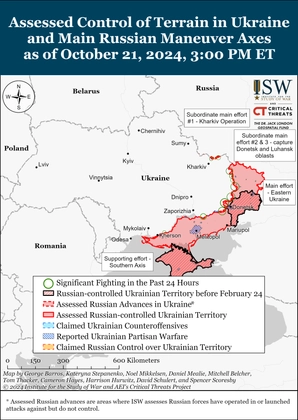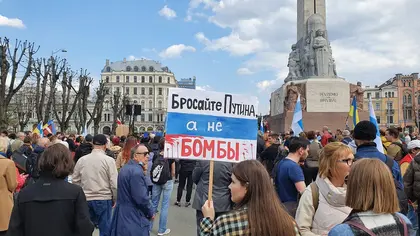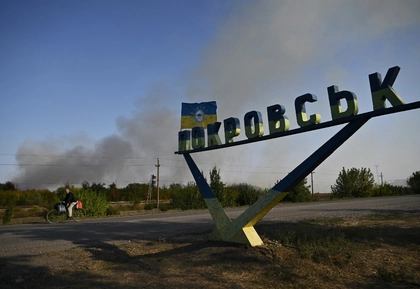It is often suggested that Russia will be different once Vladimir Putin, portrayed as the ultimate villain du jour, has faded from the political scene. However, with the military aggression ongoing, it is becoming increasingly clear that this idea does not reflect the reality as virtually the entirety of Russian society is supportive of its military aggression against Ukraine.
Be it the former President Dmitry Medvedev, Putin’s close ally Nikolai Patrushev, the Oscar-winning director Nikita Mikhalkov or the notorious propagandist Margarita Simonyan who has high hopes for global famine, the current war indisputably speaks to the masses, 83% of which approve of Putin’s actions.
JOIN US ON TELEGRAM
Follow our coverage of the war on the @Kyivpost_official.
The omnipresent anecdotal evidence only serves to emphasize how militarized and ferocious the Russians have become. When the Russian army bombed the center of Vinnytsia last week, the response of the ordinary people, both tough-looking males and ordinary females with typical kitten-embellished avatars, on various Telegram channels described Ukrainians as inferior and expressed hope that more rockets would kill them soon.
In a more disturbing twist, many families of the fallen soldiers, unmoved by their sons’ deaths, continue to spread anti-Ukrainian and western content on social media as shown by Bihus.info, while also taking advantage of the unexpected benefits of having their sons killed. For example, by buying a new Lada.

ISW Russian Offensive Campaign Assessment, October, 22, 2024
Not only do all these circumstances show that the West got it wrong when originally describing Russia’s war on Ukraine as Putin’s, but it also begs the question of where this highly militarized, propaganda-fed society is heading? And, most importantly, how does the west plan to deal with a country that is gradually yet steadily closing economically and mentally, with sanctions having a tenuous impact on ordinary folk accustomed to living in poverty?
Russia might not be necessarily turning into a USSR 2.0, sticking to its version of crony capitalism instead. But it does look like it is creating its own reality with limited interaction with the outer world, which is why it is important to contemplate the answers to these questions.
More so since traditional soft power tools are no longer an option due to draconian Russian laws that discourage the more progressive and richer classes from wanting to stand up to the regime and Russian academia severing ties with common sense.
The Moscow State University’s decision to introduce a Master’s Degree in Сountering Colored Revolutions, teaching students how to bust myths relating to “special operations” like the current one in Ukraine, is a good example of that.
Some experts believe that the war on Ukraine will lead to the demise of the Russian Federation, loss of disputed territories, and the country’s ultimate collapse. This scenario, even if enticing to some, has little evidence in support of it.
While some parts of Russia like Buryatia in eastern Siberia, which suffered heavy losses in the war, are indeed showing occasional signs of protest, the low level of civic consciousness and a society content with small financial incentives, suggests that Moscow, which keeps earning billions in fossil fuel exports, will find a way to appease these people.
This, however, does not mean that Russian society is completely immune to changes.
As the current Russian government is unable to win the war in Ukraine – at least in the way it perceives victory given that limited territorial gains are not the equivalent of a crushing defeat it had been aiming for – sooner or later disappointment is bound to kick in. Added to that, the economic situation is slowly deteriorating, which will become more tangible once Europe reduces its dependence on Russian fossil fuels,
Russia’s troubled history offers us a glimpse of what this disenchantment may lead to – limited social protests like during the 2011-2013 Snow Revolution and immediately after Feb. 24, or crowded and ideologically dangerous akin to the end of the Russian monarchy in February 1917 or the 1991 coup d’état attempt.
The first option, though not fully ruled out, appears to be unlikely as the Russian liberals do not have sufficient impact on the society. Nor are they truly liberal in the western sense of this term. Dmitri Trenin, for example, the former director of the now-defunct Carnegie Moscow Center, a regional affiliate of the Carnegie Endowment for International Peace, had chaired the institution since its inception. This circumstance, however, did not preclude him from openly promoting Putin’s agenda and imperialistic ideas.
Other figures like Xenia Sobchak, Alexey Navalny, or Ekaterina Shulman, might not see war as Russia’s reason to exist and are more concerned about the country’s economic well-being, but their approach to Ukraine, for example, is hardly sympathetic. In his 2021 interview, Navalny, for instance, effectively rejected the idea of annulling Crimea’s annexation, saying that the peninsula is not a sandwich to be passed back and forth.
The second option, which may entail plots, coups, and violent “patriotic” protests calling for military revenge, looks much likelier – even if Putin, suspected to be seriously ill, is to remain in power in the short term. Given that Russia is inevitably becoming closer, poorer, and more ostracized, this means only one thing: the west needs to draw up a new strategy and vision without ado.
Russia and its army may be the world’s laughing stock for now, with large corporations like IKEA, H&M, Lush, and Starbucks leaving the market one after another and Russian ladies fighting for the remaining Swedish-designed pans and pots. But it does not in any way suggest that this is Russia at its worst.
The latter is, arguably, still ahead of us.
The views expressd in this article are the author’s and not necessarily those of the Kyiv Post.
You can also highlight the text and press Ctrl + Enter






